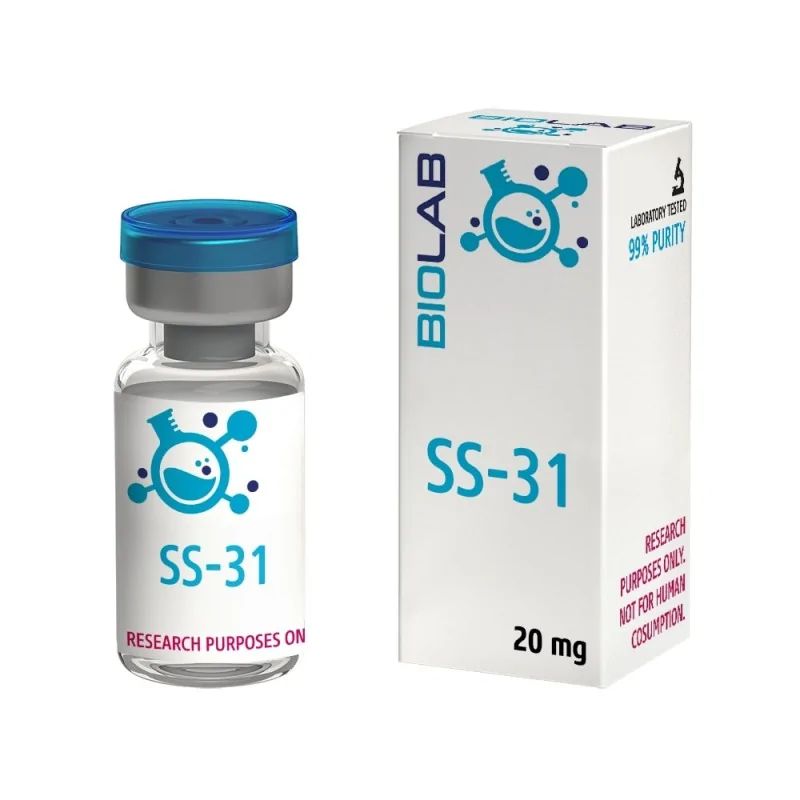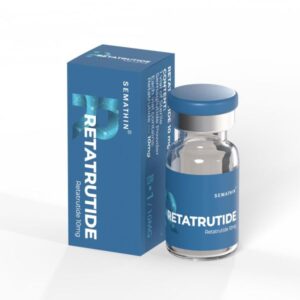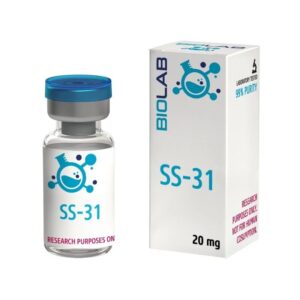SS 31 (Elamipretide): A Breakthrough Peptide for Mitochondrial Protection and Cellular Health
SS 31, also known as Elamipretide or Bendavia, is a next-generation synthetic peptide designed to protect and rejuvenate mitochondria—the powerhouses of human cells. Mitochondria are responsible for producing ATP, regulating cellular metabolism, and sustaining the health of vital organs. When these energy centers are compromised by oxidative stress, aging, or chronic disease, the result can be devastating, leading to cardiovascular disorders, neurodegenerative conditions, kidney dysfunction, metabolic syndromes, and accelerated age-related decline.
By directly targeting the underlying causes of mitochondrial dysfunction, SS-31 offers a groundbreaking solution for cellular protection, optimized energy production, and long-term health and vitality.
How SS 31 Works: A Precision Mitochondrial Mechanism
Unlike conventional antioxidants that act broadly throughout the body, SS 31 demonstrates precision targeting by binding specifically to cardiolipin, a phospholipid unique to the inner mitochondrial membrane. This ability to home in on mitochondrial structures gives SS 31 unmatched effectiveness.
-
Stabilizes cardiolipin – preserves mitochondrial integrity and prevents structural collapse.
-
Reduces oxidative stress – neutralizes reactive oxygen species (ROS), which accelerate disease progression and aging.
-
Boosts ATP production – enhances energy efficiency at the cellular level, providing vital fuel for tissues and organs.
-
Prevents apoptosis – lowers the risk of premature programmed cell death due to mitochondrial stress.
This multi-layered defense system makes SS-31 not just a protective agent but a restorative therapy, supporting resilience, repair, and regeneration at the cellular level.
Therapeutic Applications of SS 31
Extensive research suggests that SS-31 has wide-ranging applications across multiple domains of medicine and health optimization.
1. Cardiovascular Health
Cardiovascular diseases are often linked to mitochondrial damage. SS-31 offers protection by:
-
Reducing ischemia-reperfusion injury, a leading cause of heart tissue damage.
-
Improving cardiac output and blood circulation.
-
Enhancing exercise tolerance in patients suffering from mitochondrial dysfunction-related heart problems.
2. Neurodegenerative Disorders
Brain cells are particularly vulnerable to oxidative damage. SS-31 demonstrates strong neuroprotective properties:
-
Shields neurons from free radical damage.
-
Improves cognitive performance in disorders such as Alzheimer’s and Parkinson’s disease.
-
Reduces neuroinflammation and slows the progression of neurodegeneration.
3. Metabolic and Kidney Health
Mitochondrial impairment is closely tied to metabolic diseases. SS-31 contributes by:
-
Enhancing mitochondrial performance in diabetic nephropathy.
-
Lowering tissue damage caused by chronic metabolic stress.
-
Supporting insulin sensitivity and improved glucose metabolism.
4. Healthy Aging and Longevity
As people age, mitochondrial decline becomes one of the central drivers of fatigue and organ dysfunction. SS-31 provides:
-
Protection against age-related mitochondrial breakdown.
-
A boost in daily energy, endurance, and overall vitality.
-
Long-term cellular repair, helping to preserve youthfulness and physical function.
Clinical Data and Research Findings
Scientific research has built a strong case for the therapeutic potential of SS-31.
-
Preclinical studies: Showed improved mitochondrial efficiency, reduced ROS accumulation, and better tissue protection in models of heart disease, neurological damage, kidney failure, and metabolic dysfunction.
-
Clinical trials: Early-phase human studies indicated that SS-31 is safe, well-tolerated, and effective in improving exercise capacity, cardiac function, and mitochondrial biomarkers.
-
Future outlook: Current trials are evaluating its role in long-term therapies for chronic conditions, with the hope that SS-31 could emerge as a standard intervention for mitochondrial health.
Collectively, this data positions SS-31 as a promising frontier in mitochondrial medicine.
Administration and Formulation
SS-31 is typically delivered through subcutaneous injection, ensuring rapid entry into the bloodstream and efficient targeting of mitochondrial tissues.
-
Dosing protocols: Start with controlled amounts to maintain consistency and reduce side effects.
-
Peptide design: Its small molecular size allows for high bioavailability and effective penetration into cells.
-
Safety: Minimal off-target effects due to its specific action on cardiolipin.
Advantages of SS 31 Over Conventional Therapies
What makes SS-31 stand apart from traditional treatments?
-
Direct mitochondrial targeting – rather than acting as a general antioxidant.
-
Addresses the root cause of oxidative stress, rather than just symptoms.
-
Supports tissue repair and regeneration, enhancing natural recovery processes.
-
Potential anti-aging therapy – slowing cellular decline and preserving function.
This targeted mechanism makes SS-31 a game-changing therapeutic option for chronic disease management and longevity support.
Conclusion
SS 31 (Elamipretide/Bendavia) represents a revolutionary leap forward in mitochondrial medicine. By stabilizing mitochondrial membranes, reducing oxidative stress, boosting ATP production, and preventing cellular death, it offers a comprehensive approach to supporting cardiovascular, neurological, metabolic, and anti-aging health.
As research continues to expand, SS-31 is poised to become a cornerstone peptide therapy for conditions rooted in mitochondrial dysfunction. For patients suffering from chronic diseases—and for individuals seeking improved energy, resilience, and longevity—SS 31 provides new hope for a healthier, more vibrant future.






Reviews
There are no reviews yet.